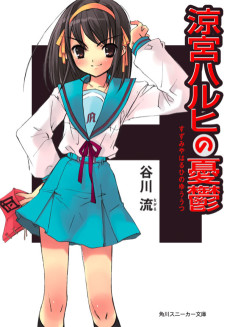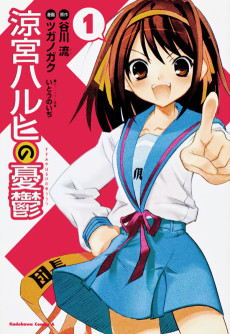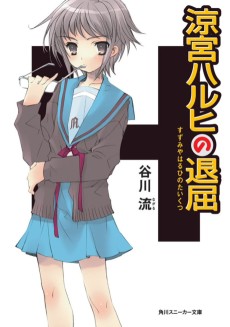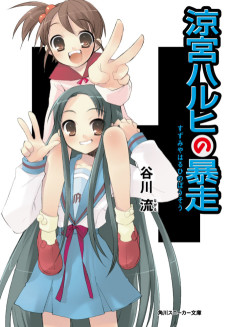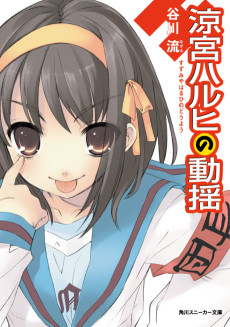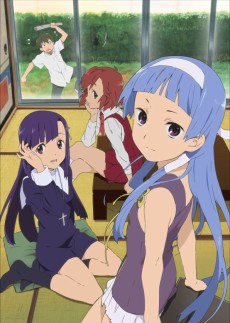SUZUMIYA HARUHI NO YUUUTSU
STATUS
COMPLETE
EPISODES
14
RELEASE
July 3, 2006
LENGTH
23 min
DESCRIPTION
Kyon, your typical high school student, has long given up his belief in the supernatural. However, upon meeting Haruhi Suzumiya, he quickly finds out that it is the supernatural that she is interested in; aliens, time travelers and espers among other things. When Haruhi laments about the lack of intriguing clubs around school, Kyon inspires Haruhi to form her own club. As a result, the SOS Brigade is formed, a club which specializes in all that is the supernatural.
Much to his chagrin, Kyon, along with the silent bookworm, Yuki Nagato, the shy and timid Mikuru Asahina, and the perpetually smiling Itsuki Koizumi, are recruited as members. The story follows the crazy adventures that these four endure under their whimsical leader, Haruhi. The story is based on the light novels by Nagaru Tanigawa.
Note: This entry is for the original 14-episode 2006 airing. The series was further expanded and reordered into a 28-episode series in 2009.
CAST
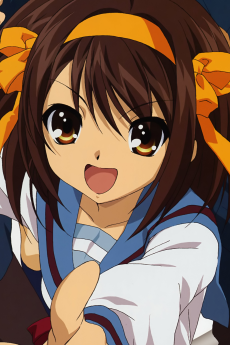
Haruhi Suzumiya
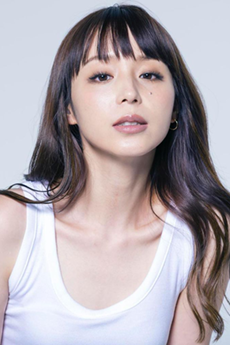
Aya Hirano
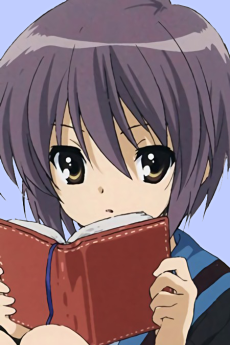
Yuki Nagato
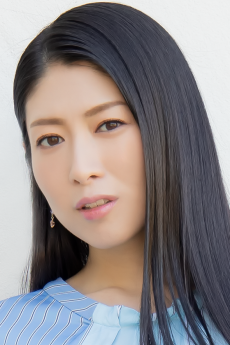
Minori Chihara
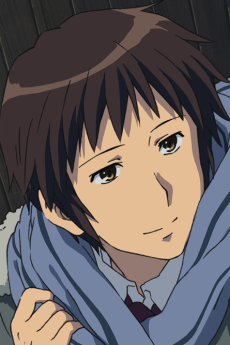
Kyon
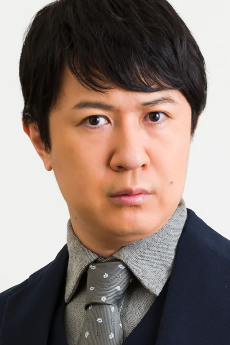
Tomokazu Sugita
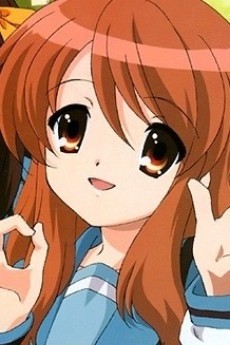
Mikuru Asahina
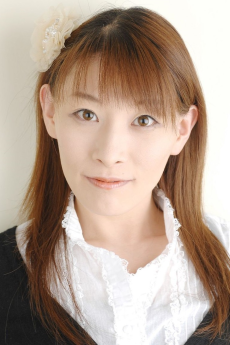
Yuuko Gotou
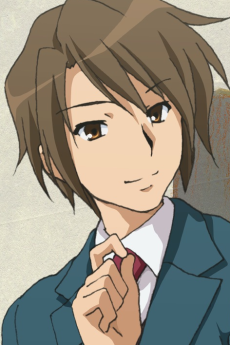
Itsuki Koizumi
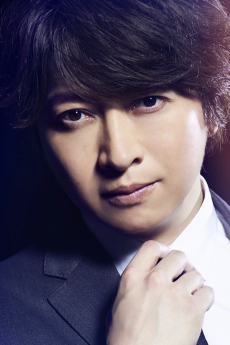
Daisuke Ono
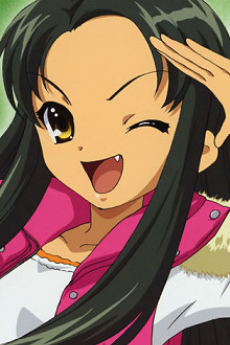
Tsuruya

Yuki Matsuoka
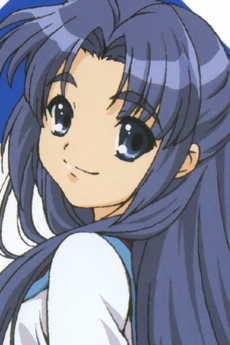
Ryouko Asakura
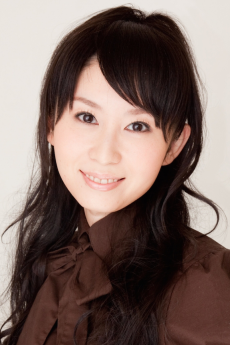
Natsuko Kuwatani
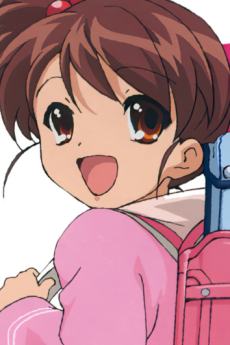
Kyon no Imouto
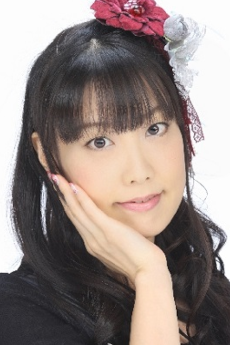
Sayaka Aoki
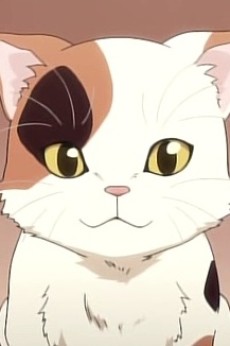
Shamisen
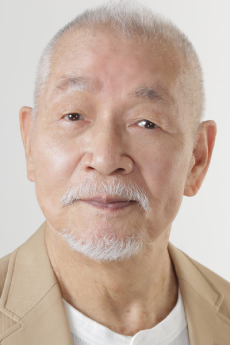
Kenichi Ogata
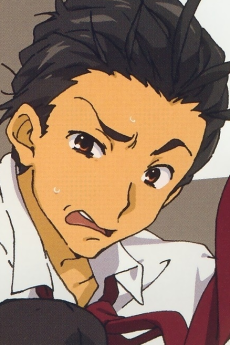
Taniguchi
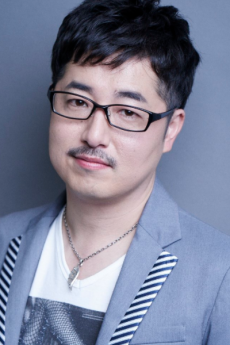
Minoru Shiraishi
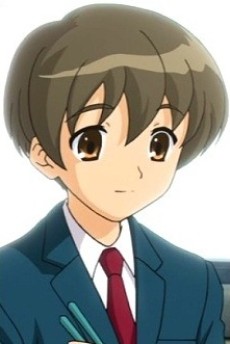
Kunikida

Megumi Matsumoto
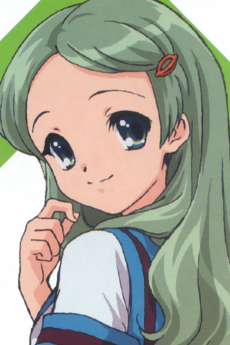
Emiri Kimidori

Yuri Shiratori

Sonou Mori

Akane Omae

Mai Zaizen

Sara Nakayama

Computer Kenkyuukai Buchou

Nobuyuki Kobushi
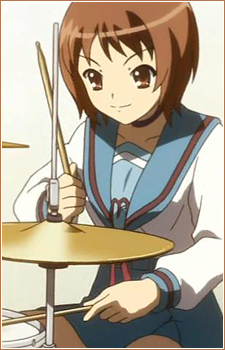
Mizuki Okajima
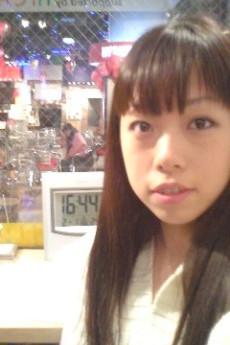
Mina Hiroe

Arakawa
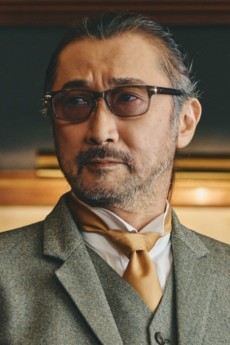
Akio Ootsuka

Okabe

Eiji Yanagisawa

Umpire

Eiji Yanagisawa
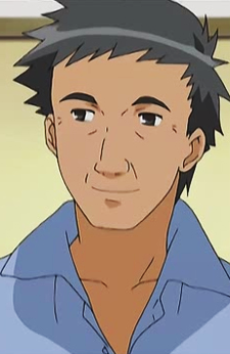
Keiichi Tamaru
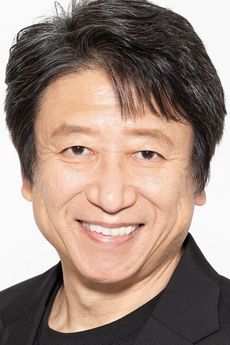
Kazuhiko Inoue

Yutaka Tamaru
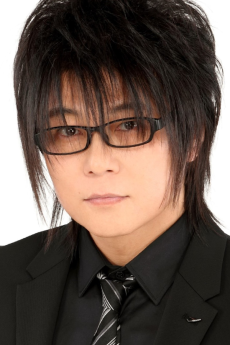
Toshiyuki Morikawa

Kiyosumi Morimura

Eiji Yanagisawa
EPISODES
Dubbed
RELATED TO SUZUMIYA HARUHI NO YUUUTSU
REVIEWS

planetJane
90/100KyoAni's mid-2000s adaptation of Nagaru Tanigawa's light novels was a pop-cultural phenomenon, and for good reason.Continue on AniList"I'm Haruhi Suzumiya, from East Junior High. First off, I'm not interested in ordinary people. But, if any of you are aliens, time-travelers, or espers, please come see me. That is all!"
Has any anime character ever introduced themselves so simply and so effectively as Haruhi Suzumiya? Right off the bat, right out the gate, before we know a single other thing about the character for certain, we get this: if you're normal she doesn't care about you, if you're some kind of supernatural entity you're worth her time. Maybe.
If you're of a certain age, and were interested in anime in even a minor way in 2006 or for several years afterward, there is a good chance you heard that opening proclamation, and not a small one that it electrified you. I've never met anyone who identified with Kyon--Haruhi's cool-headed, snarky, down-to-earth foil--over Haruhi herself, at least not at first. Haruhi's introduction to her class is both in-universe and out, a thrown gauntlet. Really, it's almost a sneer, a vocalized disdain for the willfully conformant. You are either on the side of people who have outgrown psychic powers and UFO sightings, or you are--if not an actual alien yourself--seeking those very things 24/7. There is no room in this worldview for fence-sitting, for splitting your time, for compromise. It ultimately doesn't matter that this was first penned by light novelist Nagaru Tanigawa, that it was originally a few words longer (the anime adaptation and most subsequent quotings leave out a bit about "sliders"), and that it would launch a media empire, Haruhi's class introduction is snappy and anti-authoritarian enough to serve as the otaku "Fuck The Police".
Before that Haruhi media empire, there was this, a bratty maybe-goddess blind to her own powers, demanding that the world either hand itself over to her and be grateful for the opportunity, or to simply not bother.
The older you get, the less appealing this kind of drunk charisma becomes. Haruhi is very much a doer, not a thinker, and the genuinely crazy shit she pulls in the first few episodes alone--hijacking another school club's meeting room, strongarming not one but three people into her personal Mystery Inc., dressing up in a playboy bunny outfit to pass out fliers for recruitment--wouldn't fly in a real high school, much less anywhere else in the real world. Honestly some of it (using Mikuru as her own personal dress-up doll, chiefly) is pretty deplorable! That Haruhi manages to be so damnably charming on rewatches a decade later is a testament to the sheer skill the character was written with, and the overflowing force of personality that Aya Hirano (and yes: dub actress Wendee Lee too) bring to the role. It's enough to make the viewer feel like they're the one being inducted into the SOS Brigade. Haruhi will either bring you back to your gleeful highschool otaku phase, where the biggest cares in the world were whether Light or Lelouch was the bigger mastermind, or, if you never had one, will conjure it out of thin air for you. Haruhi herself may be fictional, but the pure id part of our minds that she appeals to--the desire to rip up the mundane and dreary everyday and expose something shining and weird and wonderful underneath--is very real. To this day, Haruhi Suzumiya remains enticing for this very reason, slip in an episode--any episode, in broadcast or chronological order, as you please--and the church bells that open "Boken Desho Desho?" will transport you, if you let them, to a simpler time.
Of course, the question with these things is always "but does it hold up?" I have always been of the opinion that that is the wrong question to ask, and in this particular case I think that's doubly true. A more interesting question is that of "does Haruhi Suzumiya have anything to offer a new viewer in 2017 who did not grow up with it in 2006?" Which is both a bit of a harder question (the answer to "does it hold up" is an emphatic "yes") and a more relevant one. The issue of what this anime even is has not gotten easier to answer over the years, especially as as time's gone on its constituent genres (you could probably give someone a very rough idea of what Haruhi was by describing it as "a slice of life mixed with a supernatural mystery") have drifted even further apart than they were in 2006. Haruhi freely mixes comedy (both character humor and brazen slapstick), supernatural elements, the occasional action sequence, romantic undertones, and more. All of this with a mid-decade anime style that, despite being very much of its time, still looks pretty nice today, especially when compared to some of its contemporaries.
Haruhi wouldn't be much if it were just the title character of course. The full ensemble cast work together like the cogs of a well-oiled machine. Kyon is nothing without Haruhi to bounce off of, Yuki's Rei-pastische would be meaningless without not one but two other girls--both quite emotional in their own ways--for contrast, Mikuru's whining and general moe-ness would be annoying without Kyon's grounded, levelheaded sensibility, and so on. Each member of the SOS Brigade contrasts and highlights the others (as a side note, this is why discussions of who the best character is have always struck me as rather meaningless).
This is highlighted best in my opinion by the series' original season 1 finale (though it's only the sixth chronological episode), the sixth and final part of the titular "Melancholy of Haruhi Suzumiya" sub-arc. Haruhi unconsciously transports herself and Kyon (just herself and Kyon) to a closed, alternate-dimension version of their school. This is painted by the other characters who briefly show up (Itsuki and, via text, Yuki) as being plainly apocalyptic. If Haruhi uses her powers to create a new world, the logic goes, it will quite likely destroy the old one, where the rest of the SOS Brigade still resides. This is the sort of thing that it's very easy to oversell, but Haruhi has enough restraint that despite the stakes it doesn't fully go off the rails. Haruhi goes from terrified (a rarity for her) to ecstatic as she realizes that something genuinely supernatural is happening. Kyon pulls her back to reality by reminding her--to a masterful soundtrack of wailing, warbling choral voices--of their friends, and more or less confesses to her. All of the literal events are effectively undone by the episode's end, but the character development remains, and sees Haruhi further come out of her shell.
The first season has other highlights as well, the genuinely suspensful "Remote Island Syndrome" arc, Ryoko's reveal as an alien like Yuki in the fourth part of the "Melancholy" arc and her subsequent confrontation with Yuki (undeniably: the series' best pure action scene), the pseudo-iyashikei of "Someday In The Rain", and the climax of Haruhi's emotional development in "Live Alive", where she fronts the fictional band ENOZ (played by members of the very real ZONE) as part of the school's cultural festival, it must here be noted that "God Knows" and "Lost My Music" are two of the best songs to ever make it into an anime. Season 2, as an aside, is its own beast, and deserves a more fine-toothed comb discussion than this very broad review can give it.
So the show holds up and still has things to offer to anime viewers today, but what of its influence? Indeed, for a show that was so hugely popular it seems strange that there weren't more knockoffs. The truth of course, is that there were plenty of them, it's just that most never made it out of the light novel format and as such their influence on wider anime fandom is much diminished both domestically and in the west. Even today, something like Zeroth Maria has more than one strand of Haruhi's DNA laced into it. There Is No Haruhi In My Classroom, a series of allegedly rather cynical "response novels" should be mentioned here as well, though they've never been made available in English and thus remain obscure in the west. There is of course too, the Monogatari franchise, which has always seemed to me not unlike Haruhi squared. Made even stranger and more stylized, with almost all of the grounding elements removed (this is not to say that either is superior, but at the end of the day they are very different experiences). There is of course the Haruhi light novels themselves, which continue (at a snail's pace), and have gotten strange and arcane in their own way, as subsequent books sidelined the title character and introduced a much-expanded cast of characters who have never seen the TV screen (the anti-SOS Brigade in particular come to mind here), alternate timelines and other general esoterica. There is The Vanishing of Nagato Yuki-chan, a spinoff manga (and later anime) that removed the supernatural elements in favor of a still charming but undeniably much more normal romantic comedy, with Haruhi herself again pushed to the sidelines. There is Haruhiism, the faux-religion that sometimes nears real religion in the fanaticism of some "practitioners". There is the lingering hope, now so rote to express that it's become a punchline, of a season 3, of a reboot, of something.
There is so much, so much more that could be discussed about The Melancholy of Haruhi Suzumiya, a show that grew out of the bounds of its medium altogether and became a pop-cultural phenomenon. But I would like, if I may, to break the fourth wall a bit, and pose a thought experiment to you--the reader. Haruhi fanfiction is practically a medium in its own right at this point, and this then surely is a question many have pondered, but, if we assume that Haruhi herself is 16 at the series' beginning in 2006 (as would be the norm for a Japanese senior high student) and we pretend that time were to pass within the show's universe at the same rate it does in ours, she would be 27 now. What, do you think, is a 27 year old Haruhi up to?
I ask the question not just as an excuse for headcanonning (though that's always a bit of fun) but because I think the answer reflects a bit on the person giving it, Haruhi comes from a time before recombining popcultural influences into something new was the norm, and despite the walking wink and nudge that is the character of Kyon, it really is the title character the gives the show it's heart. Haruhi isn't quite one of a kind, but she's close.
And where in this strange mixed-up world we live in, is there a place for Haruhi Suzumiya?
Maybe nowhere, but, as I alluded to near this now far too long review's beginning, I think Haruhi (and Haruhi) appeal to a sort of inner adventure geek. The conspiracy theorist, the young adult novel binge-reader, the teenager in all of us, so maybe not nowhere, but in some small way, everywhere.

TheRealKyuubey
70/100A huge phenomenon at the time, but it perhaps hasn't aged very well.Continue on AniListOnce upon a time on a certain bow-shaped archipelago, there was a young man who had become jaded and cynical towards the world around him. Known as Kyon to his friends, as well as his relatives and anyone else he ever meets, this young man once believed in the wildest things, from aliens and the supernatural to superheroes and the evil syndicates that they battle. He’s mostly given up on such fantasies, and although he does think about them from time to time, he’s accepted reality as it is… Unfortunately, that reality is so boring and tedious that he’s settled into a deep pit of ennui, shuffling through each day in a cloud of gloom as he lets his annoying friends, his bratty sister, his fellow classmates and the punishing climb up to school up a steep hill fly right by him. Does any of it matter? Is there any point in resisting convention, going against the grain, when it will just get him branded a weirdo and a social outcast, dealing with a day to day life that’s even more underwhelming than it was previously? For the most part, Kyon had resigned himself to reality, and a long life of blase blandness. That’s when he met her.
Standing proudly during first day introductions, wearing a stern expression and speaking directly with no room for misunderstanding, Haruhi Suzumiya proclaimed to her entire class that she’ll only waste any of her time on them if they’re aliens, time travelers, or espers. This could have turned out to just be an inconsequential blip on the radar of Kyon’s life, if it wasn’t for the fact that while absently picking her brain, he winds up inspiring her to start her own school club, and use it to bring the weirdness of the world to her. Kyon winds up dragged into this plan, having sealed his fate the minute he’d decided to poke the pretty-looking bear. This club is named The SOS Brigade, a name that impressively makes less sense than it sounds, and Haruhi winds up dragging three more poor souls into her mess. They turn out ot be interesting people, but as Kyon will soon find out, they might be just a little too interesting, and the supernatural phenomena that Kyon had once given up on may have been easier to find then he or Haruhi had thought. With the boundaries between reality and fantasy becoming more blurred by the day, will Kyon ever be able to get his normal, boring life back? Or will this bizarre new routine dominate his life forever?
The Melancholy of Haruhi Suzumiya is part of what I like to call The Golden Age of Kyoto Animation, and yeah, a few points of this review are going to focus on the time frame of which it was released. In any case, this golden age occurred between 2005 and 2008, after their inaugural effort Fullmetal Panic Fumoffu, but before they’d switch to a cheaper visual style with Clannad Afterstory. The second season did fall victim to this change, but thankfully, Haruhi did not, and is a shining example of the kind of visual quality that it could put out back then. Movement is fluid, with a lot of inbetween work being done to keep everybody looking as crisp and graceful as possible, and I’m not just talking about the people in the main section of the foreground. you’ll lose track of the amount of background people, surrounding crowds and random cutaway figures there are who were given independent movement of their own, sometimes even just as good as what the main cast is getting. It does slow down in parts, but aside from a few odd choices, it all blends together well.
There are some short-cuts here and there… We get one extended segment where a character is just sitting at a chair and reading silently to herself for at least a minute or two, although you don’t have to reach very far up your ass to find an excuse for it. That aside, Kyoani is generally very clever at disguising their budget cuts from view, often using camera angles and cinematography techniques that, at the time, were easily considered avant-garde, before Studio Shaft stole them and ran them into the ground. Characters are almost realistically proportioned, and while the facial constructs lean towards moe, you wont find very many anime expression cliches in this title. If I recall, there aren’t very many if any upturned eyes, sweatdrops, anger lines, etcetera to be found. Instead, characters deliver their emotions through highly diverse and intricate facial expressions and body language. This can be pretty useful for people trying to track the true feelings of the show’s more duplicitous characters, seeing through their nuances.
Backgrounds are exquisitely detailed, down to the very smallest objects that can be pointed out in the SOS Brigade club room. On the very rare occasions that the budget seems to be dropping, it’s normally indicative of an intense visual happening soon, such as Haruhi singing as the frontman in a school rock band, or an all-out, no holds barred action scene, because yes, this slice of life title has some serious action in it. I won’t go into spoilers, at least not too deep, but when this series busts out the CGI, it’s time for jaws to start hitting the floor. Even outside of the action, which may or may not involve space fleets, alternate dimensions and a giant cricket monster, even something as menial as flowing water in a river can wind up looking beautiful. It’s a good looking show, way more-so than any title of it’s ilk has any business looking, and Kyoto Animation clearly put a lot of care and effort and good old fashioned give-a-damn into making it one of the most visually appealing titles they could.
The music isn’t quite up to par with the visuals, but it’s serviceable enough. There are several tracks that feel like they were ripped directly out of a dating game, considering how repetitive they are, but they’re still pretty fun to listen to, and a few of them have even become relatively iconic. Even when creating tunes that are just going to fade into the background and get skipped after a few repetitions in the soundtrack, Satoru Kosaki does not skimp on effort. A lot of different instruments are also used, from acoustic guitars to drums, trombones to bells, keyboards to full on electronic orchestrations, and it all comes together rather nicely. The best tunes tend to pop up during action scenes, including one of the major electronic tracks, whose very name would be a spoiler of the pivotal scene it accompanies. The climax of the series, which will happen either at the end or in the middle, depending on how you’re watching, even goes as far as to have a greek choir playing over the action and heightening the effect.
Of course, that’s just the background music. In all fairness, it probably wouldn’t be so easily taken for granted if it wasn’t for just how overwhelmingly the themes and insert songs stick out. The reason you won’t come away from this series humming Oi Oi or Nanika no Okashi is because you’ll be too busy trying to get the Live Alive songs out of your head. There’s a moment in the series when Haruhi and club-mate Yuki Nagato step in as subs for a couple of absentee members of one of the school’s biggest rock bands, and the two songs she performs… God Knows and Lost My Music… Are awesome. Not only does this scene feature some of the best animation in the series, as Haruhi is so viscerally articulated on stage that she’ll make YOU feel exhausted afterwards, but they work just as well in stand-alone for as they do in context. I’ve even heard from some people that they’re meant to be metaphorical for her relationship with Kyon, but I personally don’t see what they’re getting at.
But who are we kidding? The real stars here are the opening and closing themes, both of which can easily be counted among the best of all time. Much like the rock and roll tracks, the opening and closing are sung by Haruhi’s Japanese voice actress Aya Hirano, who both is and was a famous singer, and that talent is put to spectacular use in character. The opening, Bouken Desho Desho, which basically translates to “It’s an Adventure, Right? Right?!” Is beautifully animated with imagery that keeps pace with an incredibly catchy song, chronicling aspects of both Haruhi’s everyday life and fantasy life. The closing theme is by far the most recognizable of the bunch, Hare Hare Yukai, which translates to Sunny Sunny Happiness, and it’s notoriety can be drawn directly to it’s usage in a one-time viral video that set it to a full length, elaborate choreographed dance sequence, which was clearly designed to be addictive on both audio and visual terms. That dance is used partially in the ending theme, but they still featured all the best bits to entertain anyone who doesn’t feel like skipping ahead.
The English dub, an effort by Bang Zoom Entertainment, is a mixed bag to say the least. The writing, while nowhere near the worst effort I’ve ever heard, can occasionally sound forced and unnatural, as though the turn of phrase that they use to match the lip flaps doesn’t always sound like actual human speech. It’s not easy to describe, but for a handy example, imagine the line “Like a cat” were extended to “Like some kind of high-strung pet or something.” That’s an extreme generalization, mind you, but hopefully it will give you an idea of just how awkward the dialogue can get at times. Normal sounding words are swapped out for longer versions that don’t sound quite right, and entire sentences are sometimes rewritten for seemingly no reason at all. It gets pretty cringey when Crispin Freeman decides to ad-lib, because while his penchant for it may have resulted in a great line or two in .Hack, there’s something off-putting about a fifteen year old calling his friend “Sport.” I’m probably being too harsh, as these moments are relatively rare, but they do happen. Of course the writing is at it’s worst with the two Live-Alive songs, which don’t translate nearly as well to English as the songs from Beck do.
The acting, thankfully, is leagues above the writing, which I guess you could call serviceable over-all. First off, the name in the title may be Haruhi Suzumiya, but the main protagonist is Kyon, and his combination of snarky commentary and exasperated reactions make up about a third of the over-all dialogue. He narrates the story, doles out the occasional exposition dump, and plays the part of the audience cypher, albeit with more than enough personality to stand up as a fully realized character. Crispin Freeman is borderline perfect for this part, and while he may sound a little too old for the part, he sells every bit of it flawlessly. He’s said at a panel that he tries to play every part with genuine sincerity, and he proves it here. Wendee Lee plays the titular character, and while I hate to say that she sounds a bit miscast in the beginning, as she sounds a bit too tame and controlled to really live up to Haruhi’s spark of insanity, she does grow into the part as the series progresses, eventually standing on equal footing with Kyon.
The other actors… Well, it’s a little difficult to talk about them without going too far into spoiler territory, but I’ll try my best. Out of the characters that gravitate towards the SOS Brigade, for their own purposes of course, they all talk in fairly standard, almost stereotypical ways… This is very much intentional, for reasons you’ll come to understand, and it really takes multiple viewings to catch all of the little nuances and secret meanings that all three actors were trusted to convey. For example, johnny Yong Bosch plays the laid back, eager to please Itsuki Koizumi, and while he’s rarely seen without a smile, an astute viewer can pick up on what he’s really feeling, with a little bit of context to go with the small changes in Bosch’s delivery. Stephanie Sheh is playing very much to type, but she’s played her fair share of duplicitous characters, and the slight changes she makes in a particular episode are significant. Michelle Ruff almost feels wasted playing the monotonous role of Yuki Nagato, although in her case, she doesn’t show much variety until the second season. Perhaps the most impressive of these comes with Bridget Hoffman’s turn as a Class Rep character who’s sweet smile takes on a whole new meaning in one of the show’s climactic moments.
When The Melanchoy of Haruhi Suzumiya came out just over ten years ago, it was like nothing the anime medium had seen before, and it changed the landscape in ways we’re still seeing to this day. You may think that’s a compliment, but this series serves as living proof of how an entity can be too influential for it’s own good. First of all, taking a look at it’s most obvious contribution, Haruhi proved that a light novel adaptation can be a serious financial success. No, it’s not the first show of it’s kind to enter the public consciousness, what with titles like Read or Die and The Twelve Kingdoms being modest successes, but the vast majority of light novel adaptations that have come out did so after 2006, and you have Haruhi to thank for it. One of the ways it did this was by using odd camera angles and framing techniques to keep the viewer’s attention during long stretches of dialogue, an avant-garde tactical style it used sparingly, but was soon picked up by Akiyuki Shinbo, a Shaft director who would run it into the ground with the various Monogatari and Zetsubou Sensei titles that he put out, as well as other various properties, ultimately making the technique feel so cliched and pretentious that you really can’t look at Haruhi the same way anymore.
And it doesn’t stop there. The very premise of the series, which I won’t spoil, has been copied and twisted around over and over again by people trying to one up the original product and make their own little profit off of what they see as a proven trend. Some of these titles include Sasami-San@Ganbaranai, Kotoura-san, and Haganai, each of which take a different approach to recapturing Haruhi’s proverbial lightning in a bottle. On a more simple note, the premise of a socially unacceptable person forming a school club with unclear motives that has to find the necessary member count to stay open while filling itself up with odd characters and generally proving to be a nuisance for more people than not… Yes, all of that… Has become a very popular trend in and of itself thanks to Haruhi. Worst of all, this premise has been adopted by the harem genre, and is often used to sell merchandise based on color-coded characters from said clubs. That’s not even all, because it also proved how successful a series can be if it panders to otaku in just the right way, offering both a tongue-in-cheek parody and a sincere love letter to otaku culture, in a very for-the-fans, by-the-fans kind of way.
Where Haruhi Suzumiya was once one of the most popular and interesting shows around, It’s inspired so many copy-cats over the last decade that it’s kind of difficult to look at it with the same sense of awe that it originally inspired. What was once one of the most popular anime on the block is barely mentioned by contemporary audiences, and it’s all due to just how poorly the series has aged. Watching it in 2017, without that nostalgic context to back it up, it can get a bit cringey. I’m not saying that’s necessarily a bad thing, I’ve been guilty of turning up my nose at older anime in favor of newer titles that managed to surpass them before, but I really don’t think any of the anime that Haruhi inspired have really managed to surpass it… They’ve instead drove it’s best qualities into the ground, and while I don’t think that’s entirely fair, it does become easier to see the flaws in the material with all of those distractions taken out of the way. This includes a certain weakness in characterization, as aside from our two leads, none of the characters really impress outside of their gimmicks and relations to the plot(at least not this season), and this lack of depth can be a serious flaw if you’re not totally engulfed in what you’re watching.
One of the biggest problems, however, is the story structure. This season of the series was released out of order in Japan, and while that may not come as a surprise to anybody who regularly watches the Fox network, it’s a rarity among anime. It was done this way because when you watch the season in chronological order, the climax of the series happens in episode 7, followed by a bunch of loosely related episodic stories. This is partially because of the fact that it follows the first few volumes of the light novel to an almost religious degree of accuracy, and the first book really is the main story, with every following novel expanding and continuing the universe. I’ve read the books, and yeah, once the first novel’s over, you don’t really get anything resembling a major plot until the Disappearance story several volumes later. Because of this, the first season peaks early, and while that never bothered me for the first few years after my initial viewing, I did start to get what people were complaining about upon my recent rewatch.
It turns out the solution they came up with, and that I alluded to earlier, was to air the episodes out of order, giving you a jumbled and confusing experience, but hey, at least the peak is near the end, and the spoilers aren’t given away early! I’ll be honest, I’ve never watched it this way, but I’m also pretty sure it would only work for you if you were coming into the series blind and for the first time. Either way, this does make for a damned if you do, damned if you don’t kind of experience, neither method really offering a complete, satisfying experience. Even when I was trying to expose one of my friends to the series, all I showed him was the first seven episodes, three episodes of season 2, and the movie. The rest is largely unimportant from a plot standpoint, pointless fluff that’s geared exclusively towards people who are in love with the style and characters and just want to see more of them, which I am, although I know that I’m in a vocal minority in that respect. And if that were it’s only problem, I’d be a lot more forgiving of it.
Aside from the innovations I mentioned earlier, the only trope that this series actually manages to subvert is the Manic Pixie Dream Girl one, as we’re initially led to believe that Haruhi will be filling that role, but no, Kyon winds up filling that role for HER. That’s really clever. But every other trope that appears in this show… Every cliche they used, every character archetype, every story convention… They just exist. They appear, someone mentions the fact that they’ve appeared, and that’s about as much effort as it puts in. This is a very self-aware series, to be sure, but self-awareness does not equal depth, nor does it qualify a story to call itself smart or satirical. You can’t even really call it mature, as even with the show’s biggest secret revealed, the premise ultimately boils down to humoring an insufferable brat to keep them from throwing a world-ending tantrum. Kyon and Haruhi are one of my favorite anime pairings, as I really do feel that they complete each other, but that dynamic is still pretty questionable, almost as much so as the self-insert stuff that’s going on, but don’t even get me started on that.
The Melancholy of Haruhi Suzumiya was available from Bandai Entertainment, and while that company did go under, it’s been rescued and redistributed by Funimation. The entire series can be found on DVD and Bluray in countless different collections and formats, very few of which are actually expensive. A second season, as well as a movie called The disappearance, are also similarly available. Spin-off series Haruhi-chan and Churuya-Chan are also available. Several different written versions, including the original light novel series by Nagaru Tanigawa a handful of manga adaptations are also available stateside.
Well, I did it… I went into this review as honest and unbiased as I could, and as a result, I wound up saying much worse things about it than I originally intended. I’m still not sure I’ve scratched the surface of it’s issues. It’s nowhere near as smart or well written as it pretends to be, and while that does fall well within the definition of pretension, it never really goes as far as to feel pretentious. It is, as another reviewer once pointed out, to moe what Evangeleon is to Mecha… An awesome blast of fun when taken at face value, but puddle deep at best, and it just gets more and more shallow under scrutiny. Now, with me saying all that, you probably think I’ve turned my back on this show, and that I wouldn’t recommend it to modern viewers. You’d be wrong. Not only do I still love it, not only is it still number three on my top ten favorite anime list, but I still believe that even with all of it’s problems, there are still very good reasons to watch this show, even in 2017. In addition to offering a look back at one of the biggest shows of the 2000s, and setting up it’s more modern analogues, it’s still just as fun and entertaining as it ever was, but don’t expect anything too profound from it. I give The Melancholy of Haruhi Suzumiya a 7/10.

LIQfilms
80/100I want Haruhi to step on meContinue on AniListWhen analysing art, perhaps the most interesting aspect of it to me is in its ability to communicate and inspire people on a very raw, personal level. Art is certainly a very powerful thing and I’m sure everybody at some point in their lives has been touched by a piece of art before. Perhaps it was a movie that inspired you to peruse filmmaking, as the original King Kong did for me. Perhaps a novel that enchanted you to pick up a pen and ensue writing your own stories. Or maybe it was a song that gave you the motivation to finally pick up an instrument and learn to play. The pieces of art that mean to the most to us play an important role in shaping who we are as individuals, as well as our sensibilities, especially if that piece communicated with you at an early enough age. I myself have many pieces of art that have been able to profoundly connect with me before, as I’ve already talked about in previous reviews, but perhaps the most prolific, or, to use a more accurate term, important pieces in defining who I am now as a person, was a series from 2006 produced by one of the most infamous anime studios, KyotoAni, The Melancholy of Haruhi Suzumiya.
The Melancholy of Haruhi Suzumiya was the first anime I ever watched way back in late 2012, knowing full well that what I was watching was indeed anime, and it affected me at the time in ways I can’t even properly articulate. For 13-year-old LIQ, it opened up a brand-new world; a world in which I could freely explore and learn about; a world full of inspiration and creativity; a world that I could escape into from my perceived concurrent boring, everyday life. While I would still consider myself quite an aimless guy, even nearing 20 years of age, my early exposure to anime opened up my imagination as I was exposed to media that I never thought could ever be created, and anime became deeply entrenched in who I was growing into adolescence, and profoundly changed my sensibilities and taste in what I wanted to peruse in terms of narrative and aesthetic when it comes to my passion for filmmaking. For as much as I make fun of anime for all its troupes and clichés, it’s ultimately a medium I care very deeply for, as it is so intrinsically linked to my coming-of-age and Haruhi was the series that started it all, so much so that whenever I think back to it, or re-watch the show, I’m transported back to that time in my life.
While I don’t mean to delve too much into my personal life in my reviews, nor do I usually preface them with this much background information, I believe it is important when discussing Haruhi, as to me it’s an important series in defining who I am today. However, trying my best to squeeze out the immense bias I feel for this show, allow me to elaborate on why Haruhi, disregarding my personal history with it, is still a show worth your time!
Before diving into the various elements that make up the narrative, it’s worth pointing out that there exists two different ways in which you could possibly consume this series: the chronological order (which I will be referring to for the sake of this review) and the broadcast order. Perhaps only unique to Haruhi, during its original broadcasting over in Japan, the episodes were all aired in a non-linear fashion, intermixing the six-episode Melancholy Arc with the other stand-alone episodes, while the chronological order places the aforementioned Melancholy Arc in succession at the beginning of the series, with the standalones at the end. During my annual re-watches of Haruhi I’ve experimented with both modes of watching the series, both of which have their own pros and cons. If you are planning on seeing this show for the first time, then I’d strongly recommend checking out the chronological order first, as it won’t leave you in confusion, and as the Melancholy Arc is presented in succession, it will be easier to follow the events of said arc. However, you may feel that the show suddenly loses its narrative grip half way through the series and just devolves into a series of “filler” episodes (although I’d argue these still hold up on their own which I’ll get into a little later) and indeed the chronological order ends on the weakest episode in which Kyon gets a heater (I’ll be getting to that blasted episode a little later too!) Watching the broadcast order is certainly a unique ride, as the show seemingly seems to jump from random episode back to the more narrative driven Melancholy Arc, and intermixing both during its duration does help in creating better flow, but the first episode would definitely be a confusing one to start off with, if you were to have no context of the show at all. The reason for that is because the very first episode of the broadcast order is of a terrible short film Haruhi makes in episode eleven of the chronological order, and watching this film, with no framework for what is happening or who these people are will certainly be a strange experience indeed. However one may argue that this is indeed a good episode to begin with, as it conveys Haruhi’s meta humour rather well, and as this episode is followed by the first episode of the chronological order by introducing Haruhi’s character as she was absent in the previous one, could be a fine way to start. Additionally, beginning the series in such a way firsthand with no context is an experience I will never have as I watched the series in the chronological order to begin with, so perhaps for those who viewed the show in the manner opposite to mine will be able to properly articulate why the non-linear mode of consuming the show is the one in which people should try.
Ultimately, having two different ways in which one could experience the show just adds onto its overall charm, as well as its potential rewatchability (considering you didn’t dislike it by the time you watched one way of consuming the show) and, if anything, the eccentric nature of Haruhi’s narrative structure falls in line with the eccentricities of Haruhi (and by large the show itself). Regardless of which structure you chose, both are definitely ones that will (hopefully) engage with you.
Before diving into the show, first we must establish a basic plot overview: The Melancholy of Haruhi Suzumiya revolves around, well, Haruhi Suzumiya, who is known throughout her High School as being a little less than ordinary to say the least. Having spent her previous school years in search of the supernatural or of aliens through means of moving every chair in the classroom into the hallway, or painting large symbols on the ground, or some other variant thereof, Haruhi is helplessly bored of everyday life. That is, until Kyon, our sarcastic protagonist for this tale, begins conversing with her, providing Haruhi with the idea to start the SOS brigade! A brigade that is devoted for locating and finding the supernatural or mysterious and for making life more interesting!
Haruhi’s narrative is largely dependent on meta humour, poking fun at the abundance of anime and manga that feature characters with supernatural abilities while being that kind of show in of itself, with later additions to the cast who just so happen to harbour these characteristics. While I wouldn’t go as far as to say that Haruhi is a deconstruction of these types of shows or anything, it does play around with its meta elements in rather interesting and fun ways, even extending so much as to parody other genres of anime, such as the space opera in episode thirteen, or the detective genre in episodes nine and ten, all the while being able to carry the weight of these episodes just as a result of how strong the character interactions are and how much energy the show seems to permeate from itself. There’s a nice sense of variety to the episodes thanks to the unique powers each character retains to put interesting spins on otherwise mundane activities. Take episode seven, for example, “The Boredom of Haruhi Suzumiya” in which the SOS brigade plays baseball against an actual team of college students, whereupon Nagato uses her alien technology to manipulate data, in other words, to control the bat and the trajectory of the ball in her team’s favour. And, again, likewise in episode thirteen, to deactivate the computer club’s cheating system when the brigade challenges them to a video game. The sci-fi elements not only extend to making otherwise dull high school activities interesting, but in creating new scenarios entirely, from the characters travelling between different fabrics of reality, or having them encounter strange entities, keeping the show consistently engaging. There also seems to be a level of self-irony and awareness too, as our narrator, Kyon, constantly pokes fun at how ridiculous the show can get sometimes, and often breaks the fourth wall, bringing attention to the fact that we are indeed watching an anime, which to me always came off as wonderfully charming and tongue in cheek, but most importantly, rather humorous.
As I already alluded to, the series can be fundamentally split into two halves: the Melancholy Arc and the stand-alone episodes that follow straight afterwards. The former has a greater focus on more of an overarching narrative, mainly centred around resolving the melancholy Haruhi is faced with, while the second sees her trying to curb her boredom by entering her brigade in various competitions, such as baseball as I already discussed, or going on retreats. While it would seem that the latter half would be weaker than the former as it follows less of an overarching narrative, I’d argue that it still holds up, not only for the energy and character interactions that I mentioned in the previous paragraph, but because the latter half still develops Haruhis and Kyon’s relationship while subtly providing introspection into the other characters, all the while building upon established characterisation. One such example of this would be in the thirteenth episode, in which, Nagato, a character who had been thought of as having no interest in anything aside from books, has fun playing a video game, and by the end of the episode actually admits that she would want to go back next door to play from time to time, adding a new layer onto her character, and making her feel more human (well, as human as possible considering that she is essentially an incredibly sophisticated stream of information, or, in other words an alien!)
While I feel that the latter episodes have enough vigour in them to remain enjoyable, I couldn’t make the argument that they’re all as strong as each other, as is the case of the final episode in the series, in that it is an entire episode of Kyon travelling to a shop to obtain a heater. That’s it! Aside from being incredibly dull anyway, the episode is padded with about three whole minutes of just Nagato sitting on a chair and reading, while the sound of a nearby club, assumingly the drama club, rehearse their play. Occasionally, she turns a page. Sometimes she doesn’t. Riveting! For the final episode of the series, it doesn’t particularly leave a good final impression and is the reason many advocate for people to watch the show in the broadcast order, to avoid leaving the show on such a low note. Funnily enough, it seems KyoAni were even aware of this themselves, and of the reaction this episode must have igarnered from the Japanese fans at the time, as, a year later in their next series, Lucky Star, the protagonist, Konata, upon watching said episode, remarks that, “they really cut corners on this one. Nagato just sat there the entire time!”, before turning to her computer screen and baring witness to the flame war initiated as a result of that enthralling episode.
However, even this weaker episode was still able to contain a wonderful final moment between Kyon and Haruhi, cementing their relationship and bond, and this relationship is the crux of both Haruhi’s development and the entire narrative weight of the show. Haruhi’s internal conflicts and her need for escaping monotony is the cornerstone of her character, and while the other members of the brigade exist solely for her desires (Nagato as the accessory, Koizumi as the man who doesn’t refuse any of her requests and agrees with her on everything and Mikiru as her plaything) it’s ultimately Kyon, the human of the group, who she reflects her personal hang-ups onto, and who has the greatest influence on her actions, making her realise that indeed she is truly human. Haruhi’s desire for an interesting world filled with interesting things is completely viable, as is evident in her short monologue to Kyon in which she talks about the time in which the cold truth was finally thrust upon her. As a child, she came to the realisation that ultimately she is not all that special and is just one person in a sea of millions of people in all of Japan, which not only justifies why she acts the way she does, but it also aids in crafting a more emotionally dense character, and is a definitive point in their relationship as this was the first time she had probably ever revealed such personal information to anybody in her life.
Moreover. in the latter half of the series, Haruhi changes in subtle yet meaningful ways in her relationship with Kyon. Such an example is when she gets irritated when Kyon and Mikiru get along with each other indicating personal feelings for him, or when Kyon’s words have influence over her actions and she thinks twice, as is the case when she offered Nagato or Mikiru as a prize to the Computer club if they won the aforementioned video game challenge.
Perhaps the most interesting moment in the series in which Haruhi’s character grows is in episode twelve, in which Haruhi steps in to cover for a band whose lead guitarist and singer had accidentally sprained her ankle. After doing so, she is thanked for her efforts, in which Haruhi, instead of acting arrogant or boastful at her achievement like one would expect from her character up until that point, doesn’t know quite how to respond and ends up being bashful as a result. Haruhi is not used to people appreciating her, but what’s most significant about this is how she drags Kyon along with her when the girls from the band come to thank her in person. Haruhi needs Kyon for emotional support, going to show just how strong Haruhi truly depends on Kyon even though she would never admit it herself. As much as Kyon would hate to admit it himself too, Haruhi truly does add colour to his life, quite literally in fact, as in the opening sequence for the first episode in which Kyon narrates about his boring everyday life free from espers, ghosts or time-travellers, everything the cinematography is of a washed out dull grey. However, when he meets Haruhi colour returns back into his life. It’s an interesting and creative way to show the affect that Haruhi has had on Kyon’s life, and is one that certainly cements their strong bond.
While Haruhi is indeed a strong female protagonist, and her eccentric, loud and egotistical personality, contrasted with that of Kyon’s sarcastic and cynical comments, is enough to hold the show together, there are some elements of her character that come across as trite. Most notoriously are the scenes in which she forcibly changes Mikiru into different outfits, be it either a maid or into a bunny girl, just to work in some forced fanservice and to market figures and other lewd merchandise that you would expect from a scantily clad anime chick. These scenes are easily the weakest of the entire show, and it’s a similar problem I had with a later KyoAni show, K-on, in which the teacher of that respective series would dress the girls up in innumerable outfits. Mikiru as a character anyway serves very little purpose in the narrative, other than to just drop a hint to Kyon which comes in handy when he finds himself in a helpless situation with Haruhi in episode six, and is more so of the mascot character, as quoted by Haruhi herself.
Nagato, aside from being my first anime crush (I have a serious thing for smart girls with glasses and short hair) commands a lot more presence in the narrative than that of Mikiru, and even has a pretty entertaining fight sequence in the forth episode. Nagato’s deadpan, serious face and mannerisms always put a smile on my face, and she even has a few moments at trying to replicate comedy, such as when she refuses to open the door for Haruhi in episode ten due to her following Haruhi’s orders to an absolute. Much of Nagato’s character gets developed in the move tie-in, The Disappearance of Haruhi Suzumiya in 2010, which was actually my favourite movie of all time back when I had watched it those many years ago and comes highly recommended too.
One piece of criticism I’ve seen regarding Nagato, and the show at large, is how she is essentially a dispenser for exposition, such as in the case of the beginning of the third episode, but I believe this can be generally excused if we take into account Nagato’s character, and how it makes sense for her within the context of the narrative to talk on in long unbroken takes about complicated and intricate systems due to her essentially being a stream of conscious information. Besides that, the few exposition scenes in the series were fine for me, either because they were pretty short to begin with so they didn’t feel overwhelming or they were intermixed with Kyon’s sarcastic comments making them enjoyable to watch, so I’d argue that to make the case of exposition being a problem in the show would be a pedantic one to make. The final character worth mentioning is Koizumi, the somewhat pretentious Esper who, as noticed by Kyon, seems to be putting up an artificial personality of who he truly is in front of Haruhi in order to keep her mental state stable. Kyon and Koizumi’s interactions throughout the series are perhaps some of the most entertaining to watch for me, as the long drawn out pretentiousness of Koizumi creates an interesting contrast with that of Kyon, but there’s also an air of playfulness about Koizumi as well which permeates itself many a time in the various activities the SOS brigade finds themselves in too; he is a character whom we can never really truly figure out and understand, and much about him is wrapped in mystery, much like the origins of the organisation he works for, playing in the meta elements once more of the secret black organisation or any variant of that kind of cliché.
The animation as a whole is pretty consistent and strong, and it really does shine in a couple of areas, such as in the aforesaid fight Nagato is involved with for all the crazy backgrounds and effects, but also during the performance of the show’s most infamous track, "God Knows!" The scene is pretty well damn animated, and the close-up shots and attention to detail in Haruhi’s face as the sweat pours down her face while she sings to the heavens are some great pieces of animation. However, there also a few moments of poor animation too, such as in the case of the already mentioned final episode, in which Nagato just sits there and occasionally moves a page, and in the case where everyone excluding Harhui face off against a giant CGI cricket. While this CGI doesn’t look too bad for mid-2000s standards (and could be argued that, as this is the only moment of CGI integration, it makes the monster seem all the more alien as it doesn’t resemble anything from the established world), there’s a shot in which the backs of the characters move up and down awkwardly like cardboard cut-outs to simulate movement and talking; it looks rather silly.
The music is also of a pretty great standard, and the track, God Knows, is a song that I have listened to so often that I don’t think I could ever forget it; it’s just so damn great! And that greatness also extends to the voice actors too, all of which do an amazing job, featuring two of my favourite voice actors for Kyon and Haruhi: Sugita Tomokazu and Hirano Aya respectively. Speaking of voice actors, Haruhi has probably my favourite English dub ever! Each member of the cast does a wonderful job at portraying their characters, with Freeman, Crispin's role as Kyon I believe outshining that of the original dub!
Additionally, every piece of music the show has to offer is so intrinsically ingrained in my mind, that every time I hear it, I am transported back to the time in which I first watched the show those many years ago, which also means I remember the embarrassing video I made of me dancing to the ending track of Hare Hare Yukai. Every time I revisit that old video, and I remember how much of a weeb I was back then in my outwards love for the medium, I want to dig a dark hole and stay there forever…
To conclude, The Melancholy of Haruhi Suzumiya is still one of the most popular anime ever made, and its legacy is still being felt today, with frequent references and call-backs in even recent seasonal shows! Haruhi was a real game changer, and the fanbase exploded when it first came out in 2006, and even though I was six years late to the party, it still had a profound affect on me. Haruhi is a series that I can’t talk about without incorporating my personal history with this community and fanbase, but, even trying to push that aside, Haruhi still has a lot to offer, through its charm, characters and meta elements, even if those meta elements could, frankly, be developed somewhat more and not just used mainly for irony. Haruhi is, at the end of the day, a series I wholeheartedly care for. Perhaps I have been biased. Perhaps I have overpraised the series and looked over its problems too much. But, I believe the relationship between the viewer and how a work connects with them is important, and hopefully I have been effective in communicating that today. With that all said and done, thanks for taking the time to read the stuff that I write, and I’ll leave you with my favourite quote from the show:
“I don’t know how I know I just know that I know you know?”
-Itsuki Koizumi
SIMILAR ANIMES YOU MAY LIKE
 ANIME ComedyOuran Koukou Host Club
ANIME ComedyOuran Koukou Host Club ANIME ActionAngel Beats!
ANIME ActionAngel Beats! ANIME ComedyLucky☆Star
ANIME ComedyLucky☆Star ANIME DramaRobotics;Notes
ANIME DramaRobotics;Notes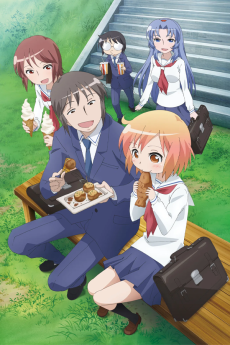 ANIME ComedyKotoura-san
ANIME ComedyKotoura-san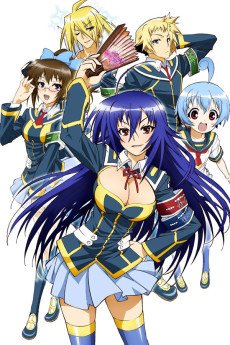 ANIME ActionMedaka Box
ANIME ActionMedaka Box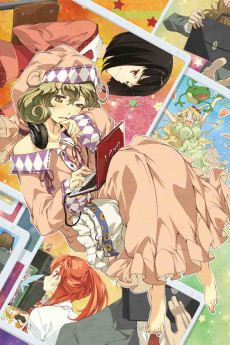 ANIME ComedySasami-san@Ganbaranai
ANIME ComedySasami-san@Ganbaranai
SCORE
- (3.8/5)
TRAILER
MORE INFO
Ended inJuly 3, 2006
Main Studio Kyoto Animation
Favorited by 3,487 Users

